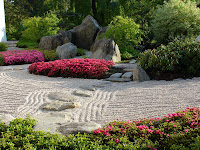

Temple Fumonji at Eisenbuch is about 1 hour by train from Munich. This temple was founded by Fumon Nakagawa Roshi in 1996 although Nakagawa Roshi has lived in Germany for about 30 years. Life at Fumonji is extremely quiet and Nakagawa Roshi encourages people to come to the temple and restore and heal themselves in the country atmosphere.


There is a fair amount of land surrounding the temple on one side although there is a small hamlet adjacent to it outside the gate. here is a deep se

nse of peace and there is hardly a place you can look that doesn't please the soul. Several rock gardens have been put in place. The top left picture is the entry where the full moon meets the stone mountain in the center of the garden. The experience is immediately quieting. Two main buildings form in "L" around this garden.
Nakagawa Roshi gave me a tour and we had a chance to talk together for a couple of hours about our views of practice in Europe and Japan, about combining healing practices with Zazen, about Soto Zen practice in general. Since he had a student in hospital, he had to leave until he returned after dinner. We showed him the Ryokan san biography film. Afterward, as the day had been quite warm and glorious, we sat outside over the other rock garden shown in the upper right picture while Roshi played shakuhachi. We were lifted outside of ourselves by the haunting sound.

In the morning we sat Zazen and chanted Morning Ceremony. Roshi and the two women who live at the temple and train and work there were good enough to offer us tea after breakfast in the entry garden and then see us off to the station.
It is possible for anyone who wants to train and work with a positive attitude to go to Fumonji. There is no heavy tuition to keep up, but you have to be willing to be a Zen student while you are there. They have a new website which you might want to check out www.eisenbuch.de which lists their schedule and activities in English and in German. Roshi speaks English as do the women who are living there to support the daily life of the temple. One could do quite well there even if you don't speak German.
The expression of Fumonji is clearly Japanese and it is a place of practice in the Soto Zen style. The residence can house up to 40 people for a sesshin with beautiful rooms each with private bath. This former old country inn has been transformed to Zen practice, but I could still hear the singing and laughter from the merry makers of times long gone. Perhaps the deep silence allows room for the echoes of history.

